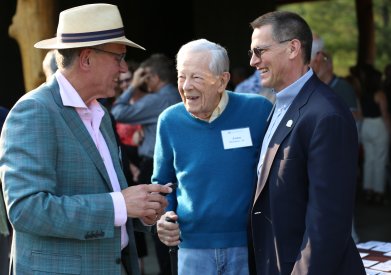Eroding Trust and Conflicts of Interest
May 29, 2019
In 2006, the ABIM Foundation and the Institute on Medicine as a Profession (IMAP), a non-profit health care think tank based at Columbia University, made a bold move to publicly confront the issue of physician conflict of interest (COI) and expose its threat to medical professionalism.
A panel assembled by the Foundation and IMAP published in JAMA a set of principles promoting transparency and calling for eliminating—rather than merely managing—conflicts. Indeed, the authors urged banning gifts of any sort – the “no pen” rule. These principles led to the adoption of explicit COI policies by the Association of American Medical Colleges, the Institute of Medicine, and others. The Foundation has continued to focus on conflicts of interest, sponsoring education and research efforts and supporting transparency.
Thirteen years later, we need to see a more active interest, even an organized movement, in combating conflicts among physicians, organizational leaders, foundations and the federal government. This is particularly important because of the relationship between conflicts and overuse, the focus of our Choosing Wisely campaign.
Vitamin D offers a prime example of how conflicts and overuse are intertwined. The story – as reported by the New York Times last summer – is one of bad science and financial self-interest. It describes how endocrinologist Michael Holick “perhaps more than anyone else is responsible for creating a billion-dollar vitamin D sales and testing juggernaut.” Reporter Liz Szabo describes how Dr. Holick received $10,000 monthly payments from a laboratory company but notes that he disputes the idea that those payments affect his prescribing and active promotion of vitamin D, or his “extreme” enthusiasm about the merits of vitamin D screening and vitamin supplements. Poorly designed published studies added to the false narrative about the benefits of vitamin D.
In reality, the vitamin D fanfare has occurred in the face of caution from many experts against the overhyping the supplement. For example, the Choosing Wisely campaign features recommendations against routine screening among adults (from the American Society for Clinical Pathology) and against ordering supplements in children (American Academy of Pediatrics – Section on Endocrinology).
Examples like this erode the public’s trust in physicians and the health care system as a whole. It maddens me to see this occur in health care in 2019, when affordability is causing so much public pain and financial hardship.
How does this misinformation get so widely spread and disseminated over a short period of time? We need tools to combat misinformation when it arises. The Foundation is searching for answers to how we can limit the spread of bad health care practices.
It appears that health insurers have taken notice and will no longer pay for what they consider to be unnecessary care. In March 2018, Cigna became the first to deny coverage for vitamin D testing unless medically necessary for specific age groups. Others are likely to follow as employers use the principles of Value-Based Insurance Design (VBID) to advocate for limiting coverage of low value care while providing more generous coverage for high value services.
Susan C. Chimonas, PhD, an expert in conflicts of interest and a past winner of our John A. Benson, Jr., MD Professionalism Article Prize for her article about physician views and experiences of the Sunshine Act, wrote that national policies have not lived up to their promise. She also found through multiple in-depth interviews that practicing physicians have a poor grasp of basic COI principles. We need to improve physician awareness, which will require funding for additional research, raising our standards, and encouraging physicians themselves to address conflicts aggressively and treat them intolerantly.
We at the ABIM Foundation continue to pursue a professionalism framework as our North Star for changing health care clinicians’ attitudes and performance. This is manifest both in our Choosing Wisely work and now in our new focus on building and rebuilding trust in health care.
We believe that there are practices that can build trust, including transparency about conflicts, and practices that can erode it, such as physicians receiving inappropriate gifts from industry. As our work on trust evolves, we will use this blog and other communications vehicles to call out trust builders (such as through our Trust Practice Challenge) as well as practices that destroy trust.
In the meantime, I will not take vitamin D; instead, I’ll take a walk in the park.

Daniel B. Wolfson
EVP & COO, ABIM Foundation


